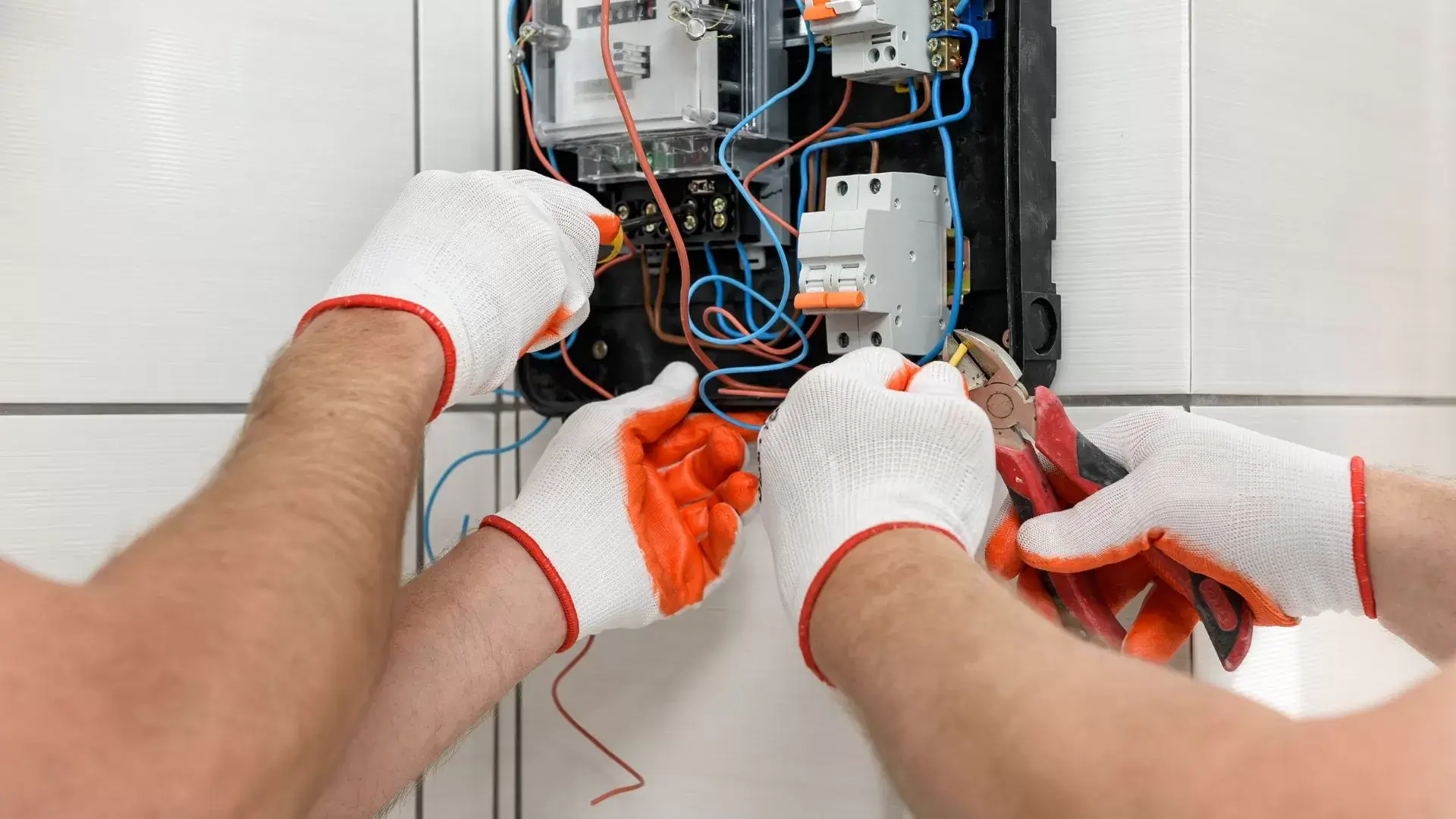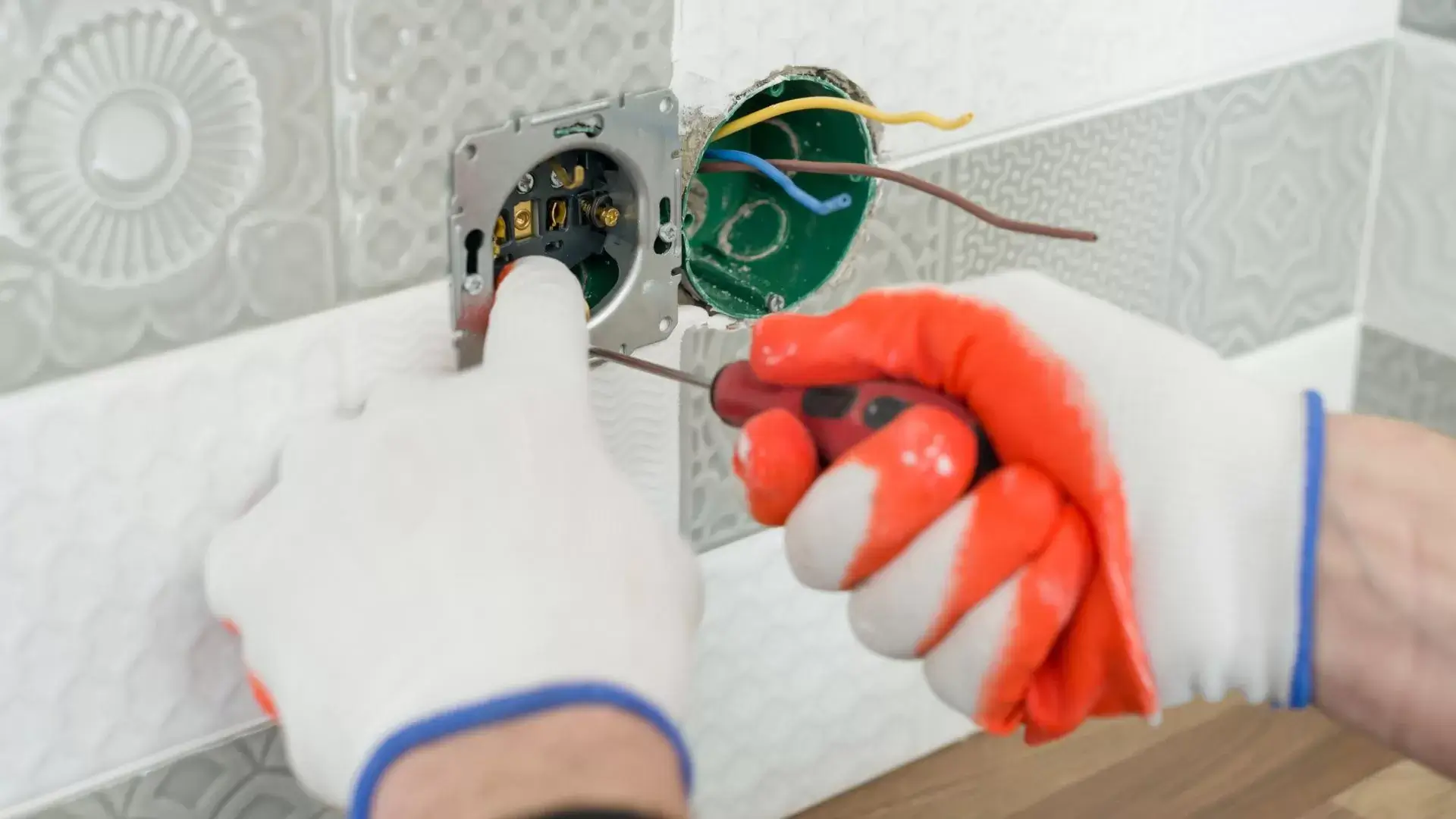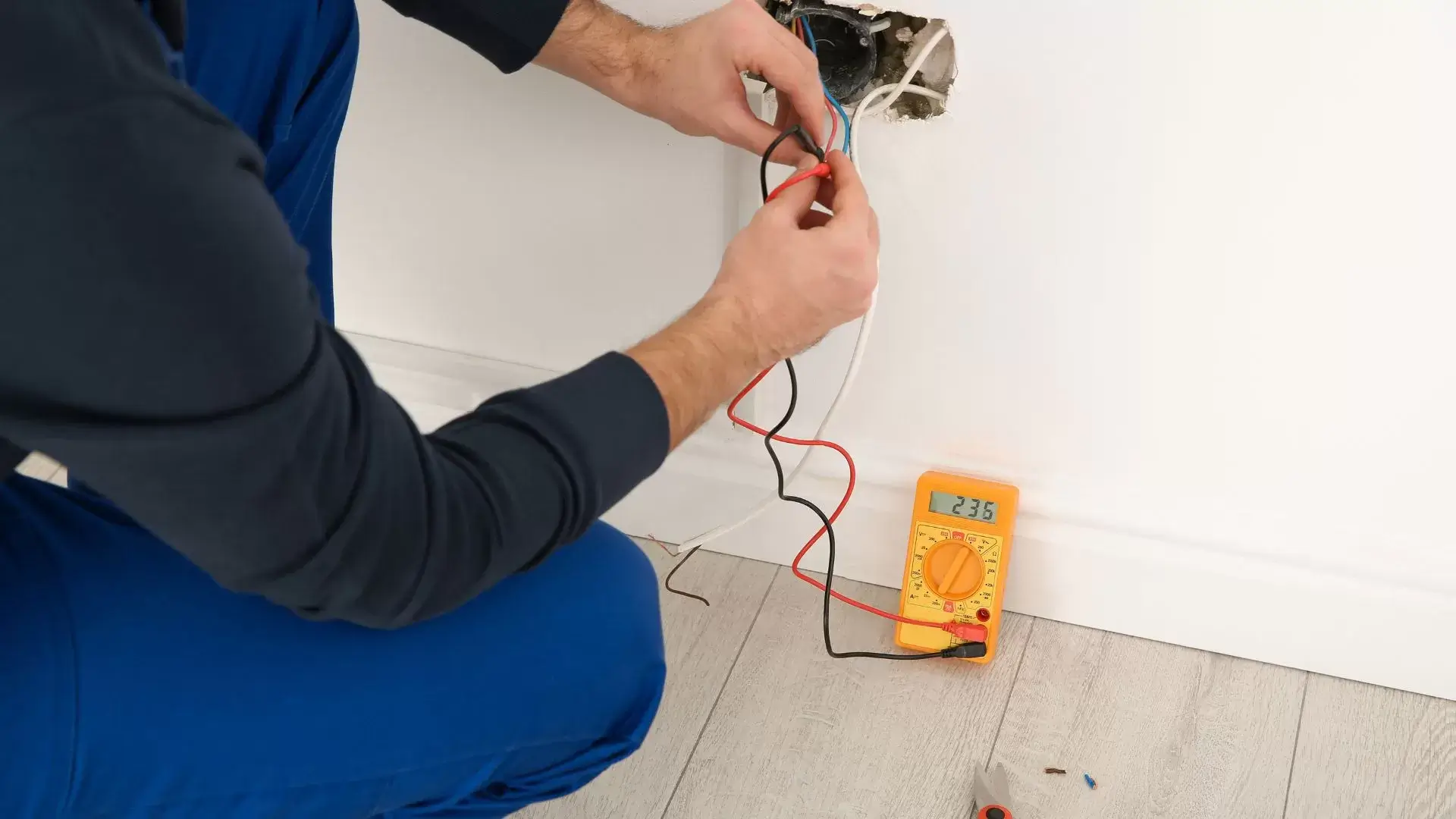Outlet and Plugs, Installation and Replacement
iCAN Electricians Services
- Electrical Services
- Aluminum Wire Replacement
- Bathroom Exhaust Fan Installation
- Electrical Circuit Panels, Installation and Replacement
- Electrical Finishing Installation
- Electrical Rough-In Installation
- Electrical Service Panel Upgrade
- Electrical Wiring and Cabling, Installation and Replacement
- EV Charger Installation
- Heated Floor Installation and Replacement
- Home and House Automation Installation
- Inspection and Safety Check, Installation and Replacement
- Light And Blub Fixture, Installation and Replacement
- Motion Sensor Light Installation
- Outlet and Plugs, Installation and Replacement
- Overhead and Underground Electrical Supply
- Pot Lights and Recessed Lighting, Installation and Replacement
- Security Camera Installation
- Smart House Installation
- Smoke and Carbon Monoxide Alarms, Installation and Replacement
- Strip Light Installation
- Bathroom Exhaust Fan Repair
- Electrical Circuit Panels Repair
- Electrical Emergency Repair
- Electrical Wiring and Cabling Repair
- EV Charger Repair
- Home and House Automation Repair
- Light And Blub Fixture Repair
- Motion Sensor Light Repair
- Outlet and Plugs Repair
- Pot Lights and Recessed Lighting Repair
- Security Camera Repair
- Smart House Repair
- Smoke and Carbon Monoxide Alarms Repair
- Strip Light Repair

Outlet And Plugs Installation And Replacement - iCAN Electricians
Are you in need of some help with your electrical wiring? Maybe you’re looking to install new outlets or replace old plugs. Well, I’m here to tell you about iCAN Electricians and the amazing service they provide when it comes to outlet and plug installation and replacement.
iCAN Electricians are an experienced team of professionals who have been providing quality residential and commercial electric services for over 10 years. They understand that making changes to your home’s electrical system can be daunting, so their goal is to make sure the process is as stress-free as possible.
From start to finish, they will take care of everything – from assessing the job site and installing new systems, all the way through checking for any potential safety issues and completing a final inspection.

If you’re ready to upgrade your home’s electrical system or just want someone reliable to handle maintenance tasks like outlet replacements, then iCAN Electricians are the perfect choice for you! With their knowledge and experience on your side, rest assured knowing that no matter what type of project you have in mind, iCAN Electricians will get it done right the first time.
Types Of Outlets & Plugs
When it comes to outlets and plugs, there are several types available. Wall outlets are the most commonly used type of outlet, with a three-pronged design for connecting different electrical devices. They come in various shapes and sizes depending on your needs. Plug adapters allow you to plug into any wall outlet without having to worry about compatibility issues or safety concerns. Ground fault circuit interrupters (GFCIs) are also an important type of outlet that helps protect against electric shocks by automatically shutting off power if a short circuit is detected.
Aside from these more common outlets, there are specialty types available too such as USB charging ports, recessed lighting fixtures and even waterproof outdoor models designed for use near pools or hot tubs. Having the right kind of outlet installed can make all the difference when it comes to safely powering up your electronic devices. With so many options out there, it’s important to choose one that best fits your home’s unique requirements. With that knowledge at hand, let’s move onto why professional installation services provide great benefits.
Benefits Of Professional Electrical Services
When it comes to installing or replacing outlets and plugs, there’s no substitute for professional electrical services. Not only can they carry out the job quickly and efficiently, but their expertise ensures that it is done safely too.
Having a qualified electrician on hand can save you time and money in the long run. They have the right tools to do the work properly – something which an amateur may not be equipped with. This means that potential safety issues are avoided, reducing the risk of accidents or damage to your property. Plus, a trained expert has experience dealing with all kinds of installations, from simple plug replacements to complex wiring jobs.
In addition, hiring a professional provides peace of mind knowing that everything was taken care of correctly. Knowing that you don’t have to worry about any hidden problems popping up later down the line makes it worth every penny spent on professional services. With these benefits in place, we must now consider safety considerations when carrying out installation and replacement projects.

Safety Considerations In Installation And Replacement
Safety is paramount in all electrical work. When it comes to installation and replacement of outlets and plugs, there are a few things we need to consider for our safety. To start with, the circuit breaker must be switched off before any work can begin. This ensures that no current flows through the wiring while we’re working on it.
We must also take extra precaution when handling live wires as they could potentially shock us if not handled properly. We should avoid touching them directly and always wear insulated gloves while dealing with electricity currents. It’s important to check any exposed wires often during the process, so as to ensure that everything is connected correctly and securely.
Having all the right tools at hand is essential too; Wire cutters, screwdrivers, pliers and testers are some of the items needed to complete an installation or replacement job safely and accurately. These help minimize potential risks by providing accurate measurements and ensuring proper connections between pieces of equipment. With these considerations taken into account, one can rest assured that their outlet or plug installations will go smoothly without causing any harm or damage to themselves or others involved in the project. As such, having professional electricians on board helps make sure every step from planning to completion goes according to plan – minimizing risks throughout the entire project duration.
Tools Required For The Job
When it comes to installing and replacing outlets or plugs, there are certain tools that we need. We need wire strippers for stripping off the insulation from the ends of electrical wires so they can be connected properly. We also need a voltage tester to make sure that no power is running through the wiring before removing any existing outlet or plug. Other than these two essential items, we’ll also require screwdrivers, pliers, and an adjustable wrench.
To ensure safety while working with electricity, wearing gloves and eye protection is also important. Nowadays, many modern devices come with their own specific installation kits that contain all necessary hardware as well as detailed instructions on how to safely install them. With the right set of tools at our disposal, installing or replacing outlets and plugs should be an easy task! Moving ahead, let’s discuss the steps involved in this process…

Steps For Installing An Outlet Or Plug
We’ve got the right tools for the job, now let’s get down to business! Installing an outlet or a plug is no easy feat; however, with some patience and know-how you can make quick work of it. Firstly, switch off any power supplies connected to your existing outlets or plugs. This goes without saying – safety first! Disconnect all wiring from the unit before removing it. Use caution when handling wires as they may still be charged even after disconnecting them from their source of power. Make sure that everything is secure before connecting new wiring.
Next up, we’ll move onto preparing the wiring for the outlet or plug.
Preparing The Wiring For The Outlet Or Plug
Before we get started on installing or replacing an outlet or plug, we need to prepare the wiring. First, turn off the power at your circuit breaker panel and then test that it is truly powered down with a voltage tester. This can help prevent any injuries from occurring when working with electricity in your home.
Next, you’ll want to remove the existing receptacle or plug from the wall by unscrewing the two screws holding them in place. Then loosen up the terminal screws and scrape away any paint that may be preventing proper contact between wires and terminals. And be sure to inspect all of your equipment for signs of damage before continuing onto connecting wires to the receptacle or plug.
Connecting Wires To The Receptacle Or Plug
Now that the wiring is prepared, we can start connecting it to the outlet or plug. First and foremost, make sure all electricity sources are turned off before handling any exposed wires! Once you have confirmed there’s no power running through the circuit, begin by attaching each wire to its corresponding terminal on the receptacle or plug. Make sure the black (hot) wire is attached to the brass-colored screw, while white (neutral) is connected to silver colored screw and green or bare copper goes in ground hole. After tightening all screws securely, check once again if everything looks right.
Next step is testing our work – making sure that when we turn the power back on, everything works as intended without any hazards.
Testing The Circuit After Installation
Once the new outlets or plugs have been installed, it’s important to make sure that the circuit is working correctly. I always start by turning on all of the switches associated with the outlet and making sure that power is flowing through each one. Then, I check for any loose connections or areas where moisture has seeped into the wiring. If everything looks good, then it’s time to test the outlet itself.
I use a voltage tester to check whether there is an adequate flow of electricity from the plug socket and if there are any shorts in the wiring. This helps ensure that everything is safe and functioning properly before we move onto replacing an existing outlet or plug.
Replacing An Existing Outlet Or Plug
Replacing an existing outlet or plug is often a necessary, but simple task. Like lightning in the sky, it’s easy to miss how important this work is until you need to do it yourself. Before beginning any electrical work, make sure that all power sources are shut off so that no one gets hurt during the process.
The first step for replacing your outlet or plug is disconnecting the old wiring from both sides of the device and removing it from its wall box. Next, attach new wiring securely to the corresponding screws on either side of the new device, then carefully tuck them into their respective boxes. Finally, snap in your replacement part firmly and test it with a voltage meter before flipping back on the main circuit breaker switch. By doing this last step you can be certain that everything was done correctly and safely! As we move forward, let’s discuss some troubleshooting tips if something isn’t working quite right with your newly installed outlet or plug.
Troubleshooting Problems With Your Outlet Or Plug
If you’re having problems with your outlet or plug, it’s important to identify the source of the issue before attempting any repair work. If an appliance is not working properly when plugged into a particular outlet, first try switching it to another one in the same room and see if that resolves the issue. This could indicate a problem with just that single outlet rather than something more widespread.
If swapping outlets does not help then there may be an underlying electrical fault which requires professional attention from certified electricians like us at iCAN Electricians. We can carry out thorough diagnostic tests to determine what is causing the problem and provide fast, reliable repairs for your peace of mind. Moving on, we’ll discuss how our team can upgrade your electrical system…

Upgrading Your Electrical System
Transitioning from the previous section, it’s time to jump into upgrading your electrical system. It’s like a makeover for your home – you want everything in tip-top shape. And that includes making sure all outlets and plugs are up to snuff with current electrical code compliance standards. Picture an electrician as a personal stylist of sorts, taking the necessary steps to ensure that every outlet is properly installed and fully functional.
The process begins by assessing your existing outlets – what type they are, how many amps they can handle, etc. Once this assessment is complete, our team of certified electricians will provide recommendations on any upgrades or replacements needed in order to bring your outlets and plugs up to speed with today’s safety codes and regulations. Making these updates may be just the thing to give your home the boost it needs!
These improvements don’t have to stop at simply replacing old outlet covers or adding new ones – next we’ll discuss electrical code compliance and why it matters when it comes to keeping your family safe from potential hazards caused by faulty wiring or improper installation.
Electrical Code Compliance
At iCAN Electricians, we make sure our electrical projects comply with all applicable codes and regulations. We understand that in order to ensure the safety of your home or business, it is essential for us to adhere to these standards. Here are a few ways we guarantee code compliance:
1. Our electricians continuously review their knowledge of the National Electrical Code (NEC).
2. We use only approved materials when installing wiring systems and outlets.
3. All installations are tested by a licensed inspector before being put into service.
We take great pride in guaranteeing that every project meets local codes and requirements. This dedication helps us provide you with peace of mind as well as cost-effective solutions for all your outlet and plug installation needs. Knowing that an experienced technician installed everything correctly gives you confidence in the quality of workmanship provided by iCAN Electricians. Now let’s look at why it’s important to work with a licensed electrician for this type of job.
Working With A Licensed Electrician
Now that you know the basics of electrical code compliance and outlet installation and replacement, it’s important to understand how working with a licensed electrician can benefit your home or building project. Here are some advantages of hiring an iCAN electrician:
Cost Savings: Licensed Electricians have access to lower cost materials and labor costs due to their established relationships with suppliers. Hiring an experienced electrician may save you money on purchasing expensive parts or tools.
Timely Service. Licensed Electricians provide accurate estimates for time frames in which projects will be completed. An experienced electrician will help plan out the timeline for your project and make sure everything is done in a timely manner.
Safety Assurance: Licensed Electricians follow safety protocols to ensure all work is performed safely and up to code standards. A professional electrician ensures the job is done correctly so there won’t be any potential hazards from faulty wiring or other problems down the line.
Experience & Knowledge: Licensed Electricians bring years of experience and knowledge to every job they do, ensuring quality results every time. An expert electrician has seen countless jobs before yours and knows exactly what needs to be done in order to complete it efficiently and safely.
Working with a licensed electrician brings many benefits such as cost savings, timely service, safety assurance, experience, and knowledge – making it well worth considering when planning your next home or building project! And when it comes to finding the right fit for you, why not go with someone who specializes in outlets? With over 25 years of experience providing exceptional services at competitive rates, choosing iCAN electricians guarantees satisfaction – no matter the size of your project.
Hiring iCAN Electricians
If you are looking for the best electricians in town, then look no further than iCAN Electricians. They provide outstanding service and an unbeatable combination of expertise and experience that will ensure your electrical installations and replacements are done right the first time!
Their work is second to none:
* Their team of highly qualified technicians have years of knowledge and training under their belt.
* They can handle any job with confidence, from plug installation to complex wiring projects.
* In addition, they use only top quality products to complete all jobs safely and efficiently.
* The customer service at iCAN Electricians is simply amazing – courteous, knowledgeable staff ready to answer any questions or concerns you may have about the project.
* Plus, their prices are very competitive compared to other companies in the area.
* You won’t be disappointed in the value for money when you hire them.
When it comes to electrical services, there’s no better choice than iCAN Electricians. With their unparalleled skill set and friendly customer service, they guarantee a hassle-free experience every time you choose them as your go-to provider!
iCAN Electricians Services
Frequently Asked Questions – Outlet And Plugs Installation And Replacement Near Me
How Much Does It Cost To Install Or Replace An Outlet Or Plug?
When it comes to installing or replacing an outlet or plug, the cost can vary greatly depending on what needs to be done. Factors such as materials, labor and the complexity of the installation can all affect the final price. For example, if you need a licensed electrician to install more than one outlet in your home, this will likely increase the overall cost.
To get a better idea of what it might cost to replace or install an outlet or plug, I’d recommend getting in touch with iCAN Electricians. They have experienced professionals who are well-versed in electrical work and can give you an accurate estimate for the job. Additionally, their team is highly trained and knowledgeable about safety procedures so that everything is installed correctly and safely.
Can I Install An Outlet Or Plug Myself?
It’s natural to think that you can save a bit of money by tackling home projects on your own. After all, with the power of YouTube tutorials and online resources, almost anything is possible. But when it comes to installing or replacing an outlet or plug in your home, do-it-yourselfers should proceed with caution – like walking through a minefield!
Most outlets and plugs require some form of electrical wiring which can be dangerous if done incorrectly. Even minor mistakes could result in electric shocks, fires or other hazardous outcomes. This is why it’s best to leave this kind of work up to certified electricians who know how to safely install these components without any risk. Plus they have access to specialized tools as well as knowledge about local building codes and regulations that must be followed for safety reasons – something DIYers may not always take into account.
So while there are plenty of tasks around the house you can handle yourself (like painting walls or hanging artwork), tinkering with electricity should never be one of them. When it comes to handling serious electrical needs, trust only the professionals.
How Often Do Outlets And Plugs Need To Be Replaced?
Have you ever wondered how often outlets and plugs need to be replaced? It’s an important question, because electrical malfunctions are one of the most common causes of house fires. Replacing old or damaged outlets and plugs is essential in ensuring your home stays safe from fire hazards.
The answer depends on a few factors. First, if you’ve noticed any signs of wear and tear or damage, it’s time to replace them immediately. Additionally, older homes may have outdated wiring that can easily cause problems; this should also be checked for regular replacement as needed. Finally, industry standards recommend replacing outlets and plugs every 10 years regardless of their condition. This is due to advances in technology that make newer fixtures safer than their predecessors.
So when it comes to keeping your home safe from electrical hazards, regularly checking your outlets and plugs is key – even if they look fine at first glance! Make sure to inspect all wiring thoroughly and consider scheduling replacements according to industry standards.
Are There Any Special Tools Required For Outlet And Plug Installation?
When it comes to electrical work, safety is key. Outlet and plug installation requires special attention and the right tools for a successful outcome. But what exactly do you need? Are there any special tools required for outlet and plug installation?
To begin with, some basic DIY tools are necessary such as:
– A cordless drill/driver
– Long screwdrivers
– Wire cutters/strippers
– Electrical tape
These items can be found at most home improvement stores or online retailers. It’s also important to have access to an electrician if needed, so that they can inspect your work before turning on the power.
Having all of these tools together will help ensure that your project is completed safely and correctly. Making sure all wiring connections are secure, using proper wire nuts in junction boxes, having the correct amperage rating per circuit breaker, and installing GFCI outlets where appropriate are just a few of the critical steps involved in properly replacing outlets and plugs. Taking the time to understand each step involved will ultimately save you time and money down the road!
Does Installing Or Replacing An Outlet Or Plug Require A Permit?
Have you ever been curious about the process of installing or replacing an outlet or plug? You might be wondering if a permit is required. The answer is yes, most likely. Depending on your location, certain codes and regulations may apply when it comes to electrical work in your home.
You should always check with local authorities before beginning any type of electrical project, as permits are usually needed for anything involving electricity that could potentially be hazardous. Even though iCAN Electricians are experienced professionals capable of providing quality service, obtaining the necessary permits can help protect you from potential legal issues down the road. Additionally, having a professional electrician complete the job ensures safety and peace of mind knowing that all work has been completed according to code.
Installing or replacing an outlet or plug may seem like a daunting task. But with the help of professional electricians, you can ensure that you do it safely and correctly. With their expertise, they will provide quality service and answer any questions you have about the process.
At iCAN Electricians, we understand how important it is to get your electrical job done right. Our experienced team has all the necessary tools and knowledge to install or replace outlets and plugs quickly and efficiently. Plus, our competitive rates mean that you won’t be breaking the bank for top-notch service!
So if you’re ready to give your home some much needed TLC in terms of its electricity, don’t hesitate—give us a call today so we can bring power back into your life like a bolt of lightning!
